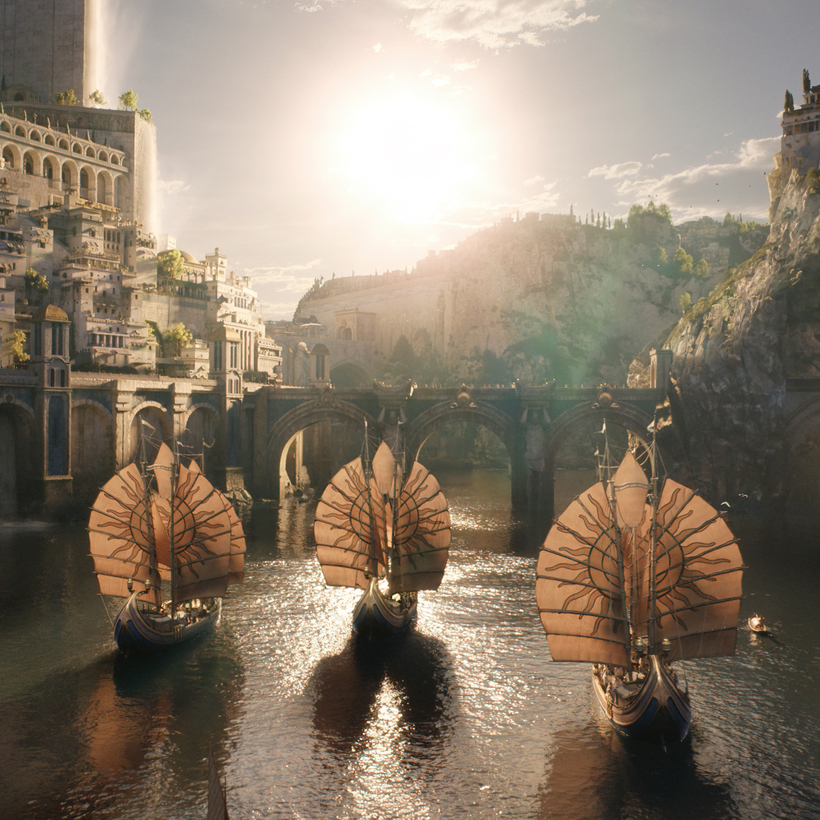Steepling cliffs of brilliant blue ice. The white sails of a thousand elven ships crossing a dark ocean. Mountain waterfalls, subterranean palaces, forests of golden-leaved birch trees. The Rings of Power, Amazon’s new Lord of the Rings prequel, looks every cent of the billion dollars Jeff Bezos reportedly spent making it. On the principle of getting my money’s worth, I felt virtually compelled to savor every gorgeous, preposterous frame.
The show just feels wealthy. It’s like visiting the Kensington of Middle-earth. Every dwarven helm is tastefully distressed, every passing elf robed in shimmering couture, every hobbit hairdo expensively frizzed and tangled.
We owe all this deluxe medievalism to the fact that one of the richest men on the planet is a Tolkien nut. The princes of the Renaissance commissioned the great artistic statements of their age: frescoes by Michelangelo, churches by Borromini. Bezos has made a defining statement of our own civilization: a billion-dollar Lord of the Rings adaptation.

I don’t even really mean this sarcastically. Fantasy is perhaps the central genre of our time. The cultural historians of the future will labor over PhDs on the 21st-century lust for imaginary worlds, painstakingly invented languages and new monsters. The highest grossing film of this century is James Cameron’s Avatar, about a planet full of cyan humanoids with pointy ears. Peter Jackson’s Lord of the Rings made more money and won more Oscars than any film trilogy in history.
It’s like visiting the Kensington of Middle-earth.
People like fantasy so much there is room in our culture not just for Tolkien but for myriad imitators, wealthiest among them George RR Martin, whose A Song of Ice and Fire books are among the best-selling novels of the century (and the source of one of its most successful TV shows, Game of Thrones). Many of the most popular video games are Tolkien-influenced: The Elder Scrolls, The Witcher, World of Warcraft.
Fantasy answers a peculiar modern need — for history perhaps, or for an alternative reality invested with profounder significances than our own. The genre didn’t really exist before Tolkien. The Victorians had fairy stories and historical legends: reheated Icelandic sagas, decorous Arthurian romances and Wagner operas. But they had no made-up worlds. No new mythologies. No fabricated languages. The first Lord of the Rings book was published in 1954 but the genre required CGI to go truly mainstream, which it duly, massively did in 2001 with the film of The Fellowship of the Ring.

Because of fantasy’s enduringly marginal reputation (the sweaty, esoteric pursuit of the basement-bound and chronically un-girlfriendable), we forget to examine our culture from this angle. But adjust your focus, and it looks quite different.
A society that is supposed to be relentlessly modern and head-spinningly progressive turns out to be obsessed with the medieval past. A culture that is supposed to be “post-ironic” and involved in a tortured and neurotic relationship with sincerity turns out to be at ease with a level of high seriousness that makes grand opera look knowing and postmodern.
The Rings of Power features characters called things such as Lord Celebrimbor of Eregion who trill their “r”s so precociously on “Morrrdorrr” and “Saurrron” they might have degrees in Elvish, and who say, “How can living flesh endure where even sunlight fears to tread?” when they basically mean, “Isn’t it dark?” Such is the atmosphere of intense, devoted earnestness that nobody thinks to find this silly.
Peter Jackson’s Lord of the Rings made more money and won more Oscars than any film trilogy in history.
Fantasy and sci-fi are great popular genres, characteristic of an age in which the authority of gatekeepers and snobs has been eroded by the democratizing forces of mass media and the Internet. In every poll of the nation’s favorite novels for decades, the public have obstinately voted Lord of the Rings into the top spot, while literary critics suffer fits of vapors over the nation’s crass neglect of Virginia Woolf.
Humorless mythological grandeur was once a snob’s pursuit. You had to get it from Tennyson’s Morte d’Arthur or a Ring Cycle at Bayreuth. Popular entertainment was almost self-consciously trivial: music hall, circuses, detective fiction. Read a modern literary novel to discover how the situation has reversed.
You might describe the cultural franchise or “extended universe” as a new art form, another of Tolkien’s inventions. The fictional “world” comes first: maps, languages, lore and characters. The books, films and spin-offs are then derived from that material. The “Marvel Universe”, the “DC Universe”. A vast Star Wars franchise yields not only films but the Disney+ series The Book of Boba Fett and countless video games and novels.

The franchise is commonly scorned as a cultural dead end: exhausted stories and characters cynically raided by studio executives after whatever profits can be extracted from a fading film industry. But you might also think of them as endlessly repeatable modern mythologies shaping the way we speak and think. Almost every English speaker knows what the Eye of Sauron is and that Darth Vader is a baddie.
“Hollywood movies are boring. Television is boring. Pop music is boring,” the literary critic Christian Lorentzen complained recently, in one of the rote lamentations of cultural decline that are so popular. But a culture in which the world’s richest man has blown more money than anyone has spent on any artwork ever on an absurdly lavish Lord of the Rings adaptation can’t be completely boring. Not to say it’s good, exactly. Just interestingly and very expensively mad.
James Marriott is the deputy books editor for The Times of London. He also writes editorials, opinion columns, and features
